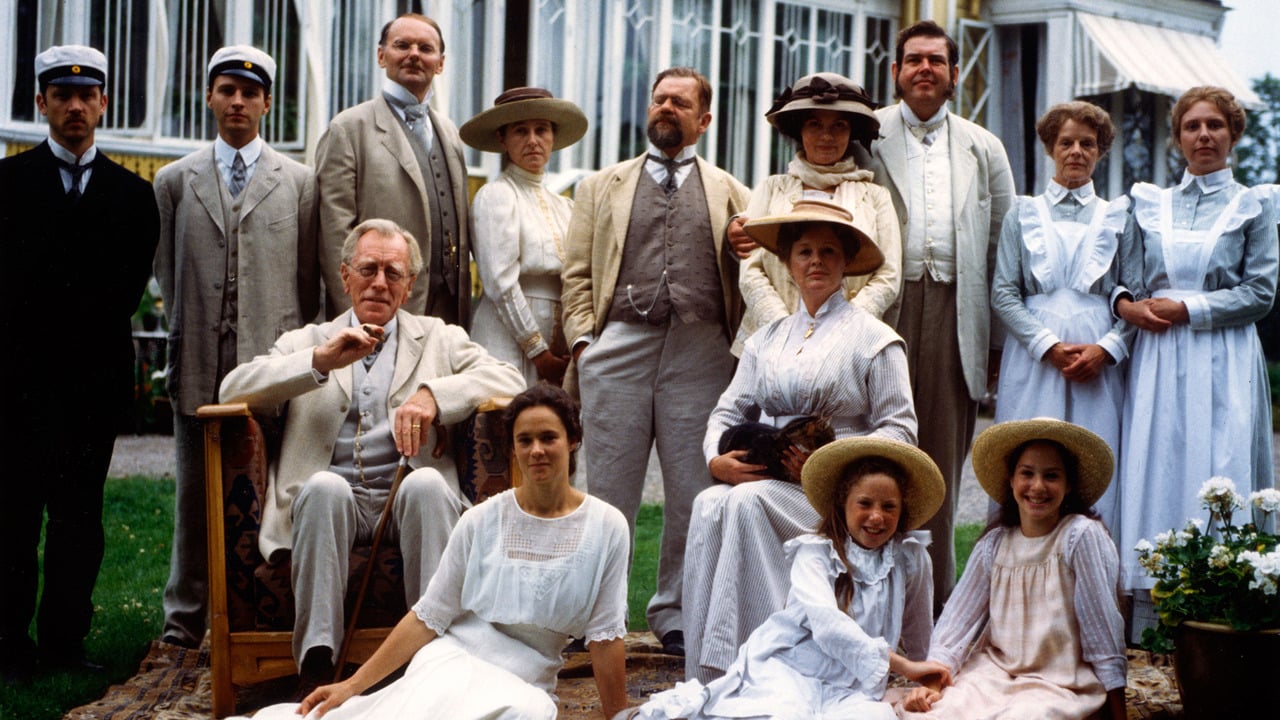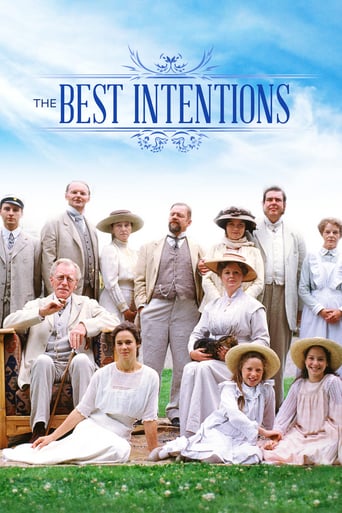



Instead, you get a movie that's enjoyable enough, but leaves you feeling like it could have been much, much more.
View MoreBy the time the dramatic fireworks start popping off, each one feels earned.
View MoreThere is, somehow, an interesting story here, as well as some good acting. There are also some good scenes
View MoreThere's no way I can possibly love it entirely but I just think its ridiculously bad, but enjoyable at the same time.
View MoreThe Best Intentions (Swedish: Den goda viljan) (1992) Director: Bille August Watched: 7/11/18 Rating: 7/10 For parents' story, Bergman hands over the reins; Finds lavish funding. Deft performances, But tedious fights/trite scenes. Haunting score/soundtrack. Her mother's rebuke. Class struggle, religious woes. Love's perseverance. Swedish beauty/Nordic gloom; Lengthy but quite affecting. Haiku Sonnets are comprised of 4 3-line haiku plus a couplet of either 5 or 7 syllables, adding up to 14 lines, the same number of lines found in a sonnet. (5-7-5, 5-7-5, 5-7-5, 5-7-5, 7-7/5-5) #HaikuSonnet #PoemReview #BasedonaTrueStory #ClassStruggle #Danish #PalmedOr #Swedish
View MoreI saw this film soon after it came out back in the 1990s. I had never seen a Bergman film, and it was by fate that I saw this one, the result of a hastily made decision to see another film when the one we had intended to see was sold out at the Innwood in Dallas Texas. I don't even recall what we had gone to see. Once inside, we found out it had subtitles, much to my consternation. Little did I know that I was going to possess one of my favorite films of all time.Some have suggested that the title Best Intentions automatically implies that there will be disappointment. I couldn't disagree more. Perhaps it is because I grew up hearing this phrase 'good intentions' all of my life, indicative of some failures but not wholly lost or irredeemable. For this film, I entered with no prejudice, not knowing anything about it or its writer/director.It is the story of two lovers in northern Sweden in the early 1900s. Henrik Bergman, a poor theology student who was befriended by Ernst Akerblom, was invited to dinner with the large family of Akerbloms. He is late and almost, but for the insistence of Anna, turns around to leave in embarrassment. She encouraged him to come in and he reluctantly obeys. Anna introduces him to the family one by one and he is seated to table for dinner. His discomfort is apparent as he, at first, began to tuck his napkin into his shirt collar, but notices everyone else keeping theirs in their laps. The family engages him in polite conversation, being quite welcoming in all. This is the first meeting of Anna Akerblom and Henrik Bergman, who would find love together.Best intentions proliferate in the saga: Henrik is conflicted about his obligation to Frida. Anna's mother, Karin, dislikes Henrick and tries to prevent her daughter from pursuing this love. bAnna becomes ill with tuberculosis and goes to a sanitorium, but she never forgets Henrik. When she recovers Anna's mother takes her on a trip to Italy, thinking that she will forget Henrik. She even intercepts, reads and disposes of a letter Anna writes to Henrik, against her husband's advice. After weeks of being away, Anna longs for home, and for Henrik. A telegram arrives and announces to Karin, that her husband, Johan, Anna's father has died. In her grief Karin reveals to her daughter that she had taken the letter to Henrik and burned it and begs her forgiveness. Yet we know that she had good intentions for her daughter, even though she had hurt her deeply.During the separation of Henrik and Anna, he becomes depressed misses Anna. Frida, proves a rare wise woman, knowing that Henrik loves Anna and will never be happy without her, meets secretly with Anna to implore her to rescue Ernst by taking him back. Finally, the lovers, together again, visit the small parish that Henrik is being called to serve as minister. Anna is not deterred when she sees the state of quarters this church offers as the parsonage, in disrepair and inadequate. Together, she and Henrik visit the abandoned looking chapel where Henrik will preach, when it suddenly occurs to him that they could be married here, instead of the big wedding Anna had already planned. Anna objects, almost insulted that her fiancee would suggest such a thing and their worst argument ever ensues. They both say terrible things they quickly regret. Henrik realizes his error, and agrees once more to the wedding Anna had planned.The remainder of the film continues to support the title. I highly recommend this film!
View MoreThe winner of the Palme d'Or in 1992, The Best Intentions gave Danish director Bille August his second win of the highest award of the most prestigious film festival in the world, for a film Ingmar Bergman had written. Bergman himself never won the award and didn't direct The Best Intentions, even though he was still directing two decades after his fictional retirement with Fanny and Alexander (1982). If most people in English-speaking countries have never heard of The Best Intentions, there may be a reason- the vast majority would find a three-hour, subtitled unhappy marriage drama unappealing and boring. To some, however, there is a lot to recommend here.The film touches on issues of faith, the role of church in a changing society, a deteriorating marriage- many topics of which appear throughout Bergman's filmography. A priest struggles on the outskirts of the world in a small community, believing he might do some good, but his wife is deeply unhappy. There are some conflicts with locals who do not like him, including for renting out the church for socialist meetings. Henrik himself is no saint, not particularly deep, sometimes violent against his wife- aspects we see of him as the fictionalized Edvard in Fanny and Alexander. But here we see him suffer a lot more, and it inspires sympathy. Edvard also suffers and I felt sympathy for him too, but Fanny and Alexander is not his film. In a way, The Best Intentions feels like both Ingmar's criticism and reconciliation with his deeply flawed parents.The Petrus subplot also inspires sympathy and shock- the running to the stream scene is by far the most intense part of the film. It's definitely worth a mention, even if it makes a small part of the running time.
View MoreHaving seen at least a couple dozen Bergman films, this biographical movie made a lot more sense to me than if I hadn't. I could see bits and pieces of his other films, particularly parallels with Fanny and Alexander. This movie was written by but not directed by Ingmar Bergman and tells about a portion of his father and mother's lives (with particular focus on the father). However, unlike the cruel and over-zealous preacher from Fanny and Alexander, Bergman's father is a flawed man full of dichotomies. A very pious and severe man with little sense of humor, he also apparently has no problem with premarital sex (with two different women) and is an advocate for the working poor. I think these inconsistencies and his father's difficulty with expressing normal human emotions lead to Bergman's earlier works (such as the professor in Wild Strawberries and the persistent theme of living in the barren wilds in movies such as The Passion of Anna and Shame).So, why didn't I score the movie higher? Well despite the insights, the movie was very long and occasionally tedious--particularly for the Bergman novices. Plus, although the movie gave us some insights, the actual span of time covered in the film was rather limited. It was like a glimpse but an incomplete glimpse of the man.
View More